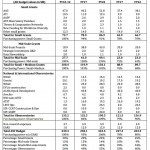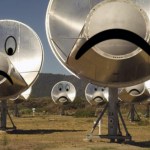NSF
The National Science Foundation returns to sponsor the USA Science & Engineering Festival and will showcase an incredible group of exhibits at the NSF and Friends Pavilion! Visit the National Science Foundation's exhibit area to explore tsunami waves, mind control, robots, spiders, cranberry acids, crazy physics experiments and more! Stage performances, a wearable tech fashion show and interactive activities will entertain and engage visitors of all ages.
Listed below is a sampling of the fun and excitement you can expect at the NSF & Friends Pavilion:
Wild…
When it is darkest, men see the stars.
This afternoon I needed to check something urgently, and as is my habit in this day and age, I jumped to a website where I knew the information was available.
A few seconds later, with some irritation I went to hit "refresh" as the request failed to go through, and then realized that it was a *.nasa.gov address, at Ames, as it happens, and I was not going to be getting that bit of data this afternoon, not without some old fashioned legwork.
A bit later I realized with increasing dismay that a signficant fraction of the illustrations for my class…
The OMB has reported on the effects of sequestration that will be triggered Jan 2013 unless Congress proactively changes the law before then.
Some time ago, Congress set itself a trap: in an attempt to look like they were dealing with government spending and the deficit, they passed a law that triggers automatic cuts to spending, unless Congress agrees and passes laws that make concomitant targeted cuts or revenue increases to decrease the deficit.
The nominal cuts are about $1.2 trillion, over a decade, cut from the projected budget in the out years, and are, by design flat across-the-board…
Anyone want to buy some telescopes?
Heavily used.
Free to a good home.
The NSF has issued a preliminary response to the NSF Astronomy Portfolio Review.
Game on.
NSF MPS/AST Response to Portfolio Review Report (pdf)
This is a 4 page response from NSF Astronomy Division Director Ulvestad to the Portfolio Review, from August 31st 2012.
Implementation is pending current budget negotiations for next fiscal year budget and plan.
Implementation requires acting by end of 2013.
Small Grants: "...Given the constrained budget scenarios and the explicitly higher-priority recommendation for AAG and…
Heads up, peeps.
NSF Portfolio Review is out
Mayall, WIYN, 2.1m KPNO, GBT and VLBA are out in recommended scenarios.
Shit.
Portfolio Review - full text 170 pp (pdf)
To summarise: Kitt Peak telescopes cut; Green Bank Radio Telescope and Very Large Baseline Array cut; McM-P Solar Telescope cut before Advanced Solar Telescope starts.
Committee recommends pre-emptive cuts based on pessimistic budget scenario.
LSST, CCAT and GSMT in.
Two scenarios:
A presumes 10% effective cut over decade
B presumes 30% effective cut over decade
From Exec Summary: "We recommend that AST avoid the risk of…
Massive Reductions in Force announced at NRAO with additional major cutback at operations and facilities.
Forwarded without comment:
"Dear Colleagues,
This message is to inform you of actions NRAO is implementing to address an expected (non-ALMA) FY 2013 budget deficit of approximately $3M for our U.S.-based facilities: the Very Large Array, Very Long Baseline Array, and Green Bank Telescope.
After careful consideration of user community and Observatory priorities, and a comprehensive analysis of our options, we have been forced to conclude that a significant reduction-in-force and a…
Last week, the House of Representatives approved an amendment to a 2013 spending bill that would prohibit the National Science Foundation from devoting any of its budget to its political science program, which, according to Inside Higher Ed, allocated around $11 million in peer-reviewed grants this year. The amendment was the brainchild of Congressman Jeff Flake of Arizona, who objected to NSF funding studies that "might satisfy the curiosities of a few academics" without benefiting society. Among the previously funded studies Flake apparently considers to be poor use of taxpayer funds are…
The C.R.E.A.T.E. strategy is an approach to making biology teaching a better model of biology, the science.
From the C.R.E.A.T.E website,
...C.R.E.A.T.E. teaching focuses on on authentic published work--peer reviewed journal articles--with students reading either series of papers produced sequentially from individual labs or series of papers from different labs focused on a single line of research.
This summer and next, the National Science Foundation is funding two identical workshops designed to help instructors learn how to use the C.R.E.A.T.E. strategy.
These will be held in June 2012 and…
I felt a sense of déjà vu Tuesday morning when I heard NPR's Nell Greenfieldboyce reporting on Senator Tom Coburn's attacks on National Science Foundation-funded research. I realized that the same thing happened last August, and I wrote about it in a post called "Scoring Political Points by Misunderstanding Science." Last year, the report mocked research into addiction and older adults' cognition (among many other projects) because the projects involved administering cocaine to monkeys and introducing senior citizens to Wii games. This year, the projects up for ridicule include…
This is why all the concern about the fake crisis of the U.S. budget deficit is so harmful--it has real effects on people's lives, including scientists:
Both Republican and Democratic proposals would cut more than US$1 trillion in spending over a decade, amounting to a budget reduction of at least $100 billion per year. Nature examines how this might affect the scientific community....
Republicans have made it clear that they will not cut defence spending, and Democrats are keen to protect social security and health-care programmes such as Medicare and Medicaid. Thus, the cuts are likely to…
I am just now recovering from last week's Art of Science Learning conference in San Diego. For something that lasted just one-and-a-half days, there was an almost overwhelming amount of great presentations, great information sharing and exchange, and -- above all -- great people dedicated to moving the idea of the Art of Science Learning forward.
When I first made plans to attend, I did so as an observer. However, soon after the presentations began on the first morning of the conference, I became an active and engaged participant. Each presentation provided me with a deeper understanding of…
There's been a lot of discussion about the report released by Senator Tom Coburn (R-OK) alleging waste and fraud by the National Science Foundation (NSF), including posts by Dr. O, Steve Silberman, Namnezia, NeuroDojo, The Prodigal Academic, and Stephanie Pappas. The first thing to realize about Tom Coburn is that he's a full-blown wackaloon--in 2004, Coburn was warning us about the looming lesbian threat:
OKLAHOMA CITY (AP) - The Republican Senate candidate in Oklahoma warns of "rampant" lesbianism in some schools in the state in a tape released Monday by his Democratic opponent.
The remark…
The National Science Foundation recently announced an ambitious plan to transform biology education across the United States called "Vision and Change." Funding for this mission is being provided by a new NSF grant program called "TUES" for Transforming Undergraduate Education in Science.
This finding may have been a surprise to some, but two year colleges have a disproportionate impact on biology education in the U.S. (1, 2). At least half of the country's biology students are enrolled at two year colleges. Additionally, community colleges often provide the only college-level biology…
It only takes a quick trip to the grocery store to see that familiar jobs are vanishing. Unless you're in Oregon, grocery store checkers are going the way of gas station attendants, travel agents, and secretaries. Jobs are changing, new jobs require different skills, and even those jobs will be obsolete within a short time.
Community colleges can cushion the blow by developing education programs in response to the needs of their local communities.
Not only do these programs help displaced workers, they help their communities attract new businesses and support economic growth. Georgia's…
As you may have heard, SETI is in trouble.
Funding cutbacks on a state and federal level have forced the Allen Telescope Array -- SETI's new homebase, actually just a part of the U.C. Berkeley's Hat Creek Radio Observatory (HCRO) -- into indefinite hibernation. With U.C. Berkeley losing ninety percent of its NSF University Radio Observatory money this year, and the growing California budget shortfalls, the hunt for extraterrestrial life has simply, and pragmatically, fallen by the wayside.
This financial deficit particularly smarts because the Allen Telescope Array was just about to…
I realize most people probably don't care very much about science funding, but I'll go out on a limb and assume that many readers here do care about science funding (I think many, in the public as a whole, don't even realize how science is paid for). The Republican platform, Pledge to America, boldly declares that all non-military discretionary spending will be reduced to 2008 levels. Here's what this would mean for science funding:
Under that plan, research and development at nonmilitary agencies -- including those that sponsor science and health research -- would fall 12.3 percent, to $57…
As mentioned in an earlier post, I was recently part of a panel on Digital Science at the NSF IGERT 2010 Project Meeting in Washington, D.C. The meeting itself brought together PIs, trainees, and project coordinators who are involved in a stunning array of interdisciplinary research programs. Since the IGERT program embraces mottos like "get out of the silos" and "think outside the box", my sense is that the Digital Science panel was meant to offer up some new-ish tools for accomplishing tasks that scientists might want to accomplish.
The panelists included Jean-Claude Bradley, who spoke…
Over at the Cocktail Party, Diandra Leslie-Pelecky has a post about the image of scientists that spins off this Nature article on the NSF's "broader impact" requirement (which I think is freely readable, but it's hard to tell with Nature). Leslie-Pelecky's post is well worth reading, and provides a good deal more detail on the anecdote reported in the article.
While Leslie-Pelecky's concern is about whether the outreach programs falling under the "broader impact" section of grants are having the desired effect, I'd like to comment on a different aspect of the article, namely the whole…
About three weeks ago, I was in Washington, D.C. for the NSF IGERT 2010 Project Meeting. I was invited to speak on a panel on Digital Science (with co-panelists Chris Impey, Moshe Pritzker, and Jean-Claude Bradley, who blogged about it), and later in the meeting I helped to facilitate some discussions of ethics case studies.
I'll have more to say about our panel in the next post, but first I wanted to share some broad observations about the meeting.
IGERT stands for "Integrative Graduate Education and Research Traineeship", and the program is described thusly:
IGERT is the National Science…
The COMPETES Act renewal, which would provide additional funding for scientific research and education, and is targeted towards technological development and commercialization was dealt a blow yesterday as Republicans pulled more obstructionist crap. Before the Republican Party was completely taken over by the enraged Uruk-hai wing of their party, they would have not opposed this. But movement conservativism means party before country (italics mine):
House Science and Technology Committee Chairman Bart Gordon, D-Tenn., Thursday blasted what he described as a "cynical" motion to recommit…



